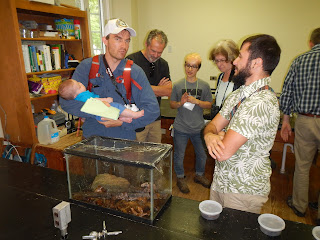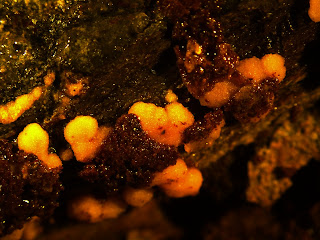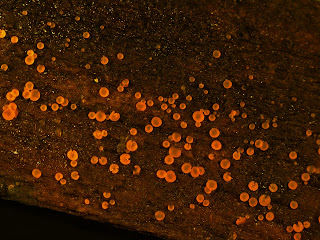Our undergraduate Biology of Behavior Institute (BOBI) summer scholar, Bay Abdullah, presented her work investigating natural populations of D. discoideum through microsatellite variation. Great work Bay!!
Ostrowski Lab
Friday, October 13, 2017
Monday, January 23, 2017
Mercer Arboretum Collection
On Friday we took a field trip to Mercer Arboretum where Mabel and Jacob took us around the property in search of slime mold soil. While we await the arrival of our slime molds, here are some photos of other interesting things we brought back with us.
Monday, September 12, 2016
Isolating Dictyostelids from Soil Samples
This week, former REU Maria Polo showed UH undergraduates how to isolate dictyostelids from soil samples. They plated out the soil on hay infusion agar plates, and the plates will be checked in ~4-5 days for slugs -- the first multicellular stage of Dictyostelium.
Friday, July 8, 2016
Mountain Lake Biological Station Open House
Every summer the MLBS invites the public to come up and see what the researchers have been working on. Every lab puts on their best show and offers a hands on experience to share their interesting organisms.
 |
| Alex Novarro showing off his salamander collection |
 |
| The art lab, providing custom face painting |
 |
| Cloe Nash and the Ant Lab |
 |
| Courtney, explaining mouse parasitism |
 |
| Fish Class |
 |
| Campanula americana lab |
 |
| Salamanders are always a hit |
 |
| Mike being sciency |
 |
| Maria loves open house! |
 |
| Juvenile Salamander |
 |
| Mature Salamander |
 |
| Work by Marc Robarge: mrobarge.com Much of his work is clearly inspired by Dicty... |
Thursday, June 30, 2016
Let's submit strains to the Dicty World Race!
A great idea for this semester's project?
Dicty World Race is a contest where participants enter their cells in a race to see who has the fastest strain.
The race is just four months away. Can we come up with a strategy to find the fastest strain?
Dicty World Race is a contest where participants enter their cells in a race to see who has the fastest strain.
The race is just four months away. Can we come up with a strategy to find the fastest strain?
Wednesday, June 29, 2016
Visit to Claytor Nature Study Center
Michael and Maria visited a new field station, the Claytor Nature Study Center, in search of slime mold samples. This beautifully preserved 470 acre property spans the Big Otter river, near Bedford, VA and the Souther Appalachians. Here are some of the treasures from the day.
 |
| Trying to capture the white slime mold. I noticed something interesting in the background of this photo. |
 |
| Possible Slime Mold |
 |
| Part of the observation deck at the main building |
 |
| Farm House |
 |
| View from the Farm House |
 |
| 5th Largest White Ash in VA. |
 |
Red raspberry slime mold (Tubifera ferruginosa)
|
 |
| Large Chestnut, likely planted by Claytor |
 |
| Jelly Fungus (Tremella?) |
 |
| Astronomical observatory housing a C Optical Systems 20-inch Truss Ritchey-Chrétien telescope |
 |
| Large predatory Beetle, likely Carabus. Feeds on snails and caterpillars. |
Thursday, June 16, 2016
Dicty fieldwork!
Michael and Maria are spending the summer at our field site at the Mountain Lake Biological Station, near Blacksburg, Virginia. They are censusing our populations around the station and will take a road trip throughout the northeast to find new ones. Maria is our NSF-funded REU, and we are excited about her planned research, which will focus on interspecific chimerism.
 |
| Hard at work... |
 |
| Hardly working ;-) |
Subscribe to:
Comments (Atom)
























